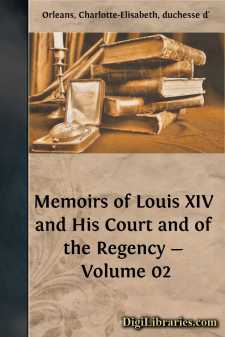Categories
- Antiques & Collectibles 13
- Architecture 36
- Art 48
- Bibles 22
- Biography & Autobiography 813
- Body, Mind & Spirit 142
- Business & Economics 28
- Children's Books 17
- Children's Fiction 14
- Computers 4
- Cooking 94
- Crafts & Hobbies 4
- Drama 346
- Education 46
- Family & Relationships 57
- Fiction 11829
- Games 19
- Gardening 17
- Health & Fitness 34
- History 1377
- House & Home 1
- Humor 147
- Juvenile Fiction 1873
- Juvenile Nonfiction 202
- Language Arts & Disciplines 88
- Law 16
- Literary Collections 686
- Literary Criticism 179
- Mathematics 13
- Medical 41
- Music 40
- Nature 179
- Non-Classifiable 1768
- Performing Arts 7
- Periodicals 1453
- Philosophy 64
- Photography 2
- Poetry 896
- Political Science 203
- Psychology 42
- Reference 154
- Religion 513
- Science 126
- Self-Help 84
- Social Science 81
- Sports & Recreation 34
- Study Aids 3
- Technology & Engineering 59
- Transportation 23
- Travel 463
- True Crime 29
Memoirs of Louis XIV and His Court and of the Regency - Volume 03
Categories:
Description:
Excerpt
It is true that the late Madame was extremely unhappy; she confided too much in people who betrayed her: she was more to be pitied than blamed, being connected with very wicked persons, about whom I could give some particulars. Young, pretty and gay, she was surrounded by some of the greatest coquettes in the world, the mistresses of her bitterest foes, and who sought only to thrust her into some unfortunate situation and to embroil her with Monsieur. Madame de Coetquen was the Chevalier de Lorraine's mistress, although Madame did not know it; and she contrived that the Marechal de Turenne should become attached to her. Madame having told the Marshal all her secrets respecting the negotiations with England, he repeated them to his mistress, Madame de Coetquen, whom he believed to be devoted to his mistress. This woman went every night to the Chevalier de Lorraine and betrayed them all. The Chevalier used this opportunity to stir up Monsieur's indignation against Madame, telling him that he passed with the King for a simpleton, who could not hold his tongue; that he would lose all confidence, and that his wife would have everything in her own hand. Monsieur wished to know all the particulars from Madame; but she refused to tell him her brother's secrets, and this widened the breach between them. She became enraged, and had the Chevalier de Lorraine and his brother driven away, which in the end cost her own life; she, however, died with the consciousness of never having done her husband any harm. She was the confidante of the King, to whom it had been hinted that it might be expedient to give some employment to Monsieur, who might otherwise make himself beloved in the Court and in the city. For this reason the King assisted Madame in her affairs of gallantry, in order to occupy his brother. I have this from the King himself. Madame was besides in great credit with her brother, Charles II. (of England). Louis XIV. wished to gain him over through his sister, wherefore it was necessary to take part with her, and she was always better treated than I have been. The late Monsieur never suspected his wife of infidelity with the King, her brother-in-law, he told me, all her life, and would not have been silent with respect to this intrigue if he had believed it. I think that with respect to this great injustice is done to Madame. It would have been too much to deceive at once the brother and the nephew, the father and the son.
The late Monsieur was very much disturbed at his wife's coquetry; but he dared not behave ill to her, because she was protected by the King.
The Queen-mother of England had not brought up her children well: she at first left them in the society of femmes de chambre, who gratified all their caprices; and having afterwards married them at a very early age, they followed the bad example of their mother. Both of them met with unhappy deaths; the one was poisoned, and the other died in child-birth.
Monsieur was himself the cause of Madame's intrigue with the Comte de Guiche. He was one of the favourites of the late Monsieur, and was said to have been handsome once. Monsieur earnestly requested Madame to shew some favour to the Comte de Guiche, and to permit him to wait upon her at all times. The Count, who was brutal to every one else, but full of vanity, took great pains to be agreeable to Madame, and to make her love him. In fact, he succeeded, being seconded by his aunt, Madame de Chaumont, who was the gouvernante of Madame's children. One day Madame went to this lady's chamber, under the pretence of seeing her children, but in fact to meet De Guiche, with whom she had an assignation. She had a valet de chambre named Launois, whom I have since seen in the service of Monsieur; he had orders to stand sentinel on the staircase, to give notice in case Monsieur should approach. This Launois suddenly ran into the room, saying, "Monsieur is coming downstairs."
The lovers were terrified to death. The Count could not escape by the antechamber on account of Monsieur's people who were there. Launois said, "I know a way, which I will put into practice immediately; hide yourself," he said to the Count, "behind the door." He then ran his head against Monsieur's nose as he was entering, and struck him so violently that he began to bleed. At the same moment he cried out, "I beg your pardon, Monsieur, I did not think you were so near, and I ran to open you the door."
Madame and Madame de Chaumont ran in great alarm to Monsieur, and covered his face with their handkerchiefs, so that the Comte de Guiche had time to get out of the room, and escape by the staircase. Monsieur saw some one run away, but he thought it was Launois, who was escaping through fear. He never learnt the truth.
What convinces me of the late Madame's innocence is that, after having received the last sacraments, she begged pardon of Monsieur for all disquiets she had occasioned, and said that she hoped to reach heaven because she had committed no crime against her husband.
I think M. de Monmouth was much worse than the Comte de Guiche; because, although a bastard, he was the son of Madame's own brother; and this incest doubled the crime. Madame de Thiange, sister of Madame de Montespan, conducted the intrigue between the Duke of Monmouth and Madame.
It is said here that Madame was not a beauty, but that she had so graceful a manner as to make all she did very agreeable. She never forgave. She would have the Chevalier de Lorraine dismissed; he was so, but he was amply revenged of her....






